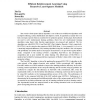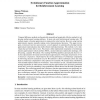34 search results - page 5 / 7 » Using Temporal Neighborhoods to Adapt Function Approximators... |
NIPS
2008
13 years 7 months ago
2008
In this paper we consider approximate policy-iteration-based reinforcement learning algorithms. In order to implement a flexible function approximation scheme we propose the use o...
ECAI
2006
Springer
13 years 9 months ago
2006
Springer
Abstract. We formulate the problem of least squares temporal difference learning (LSTD) in the framework of least squares SVM (LS-SVM). To cope with the large amount (and possible ...
JAIR
2002
13 years 5 months ago
2002
The recursive least-squares (RLS) algorithm is one of the most well-known algorithms used in adaptive filtering, system identification and adaptive control. Its popularity is main...
CORR
2010
Springer
13 years 5 months ago
2010
Springer
Temporal difference methods are theoretically grounded and empirically effective methods for addressing reinforcement learning problems. In most real-world reinforcement learning ...
ICML
1999
IEEE
14 years 6 months ago
1999
IEEE
Excerpted from: Boyan, Justin. Learning Evaluation Functions for Global Optimization. Ph.D. thesis, Carnegie Mellon University, August 1998. (Available as Technical Report CMU-CS-...


